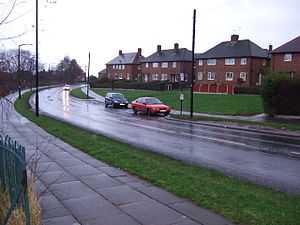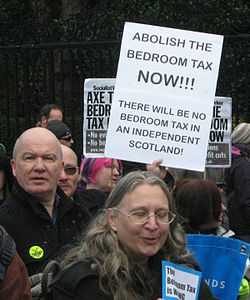Under-occupancy penalty

The under-occupancy penalty (also known as the under occupation penalty, under-occupancy charge, under-occupation charge or size criteria)[2] is a reform contained in the Welfare Reform Act 2012 whereby social sector tenants with rooms deemed to be 'spare' face a reduction in Housing Benefit, resulting in them being obliged to fund this reduction from their incomes or face rent arrears and potential eviction by their landlord (be that the local authority or a housing association). The under-occupancy penalty has been branded the Bedroom Tax by critics of the changes who argue the changes amount to a tax given the lack of social housing for affected tenants to downsize to. Supporters of the changes have referred to the unreformed system as a "spare room subsidy"[3] whereby tax-payers are said to be subsidising social housing tenants living in houses larger than their needs require. The reforms are one part of the British Coalition Government's wide-ranging welfare reform agenda which includes the introduction of Universal Credit, the introduction of a cap on the total size of the welfare bill (see Welfare Cap), reform of Council Tax and reform disability benefits (see Personal Independence Payment).
Policy
The under-occupancy rules apply from 1 April 2013 and applies to all those of working age . Having one bedroom more than the calculated allowance means a reduction in housing benefit of 14%, and two "spare" bedrooms means that a tenant will lose 25% of their housing benefit.[4]
Exemptions
A number of types of housing are exempt from the changes. These include those living in temporary accommodation, shared ownership accommodation and non-standard accommodation such as houseboats and mobile homes.
There is a further category of exempt accommodation defined as "accommodation provided by a housing association, a registered charity or voluntary association where that body, or a person acting on its behalf, also provides the claimant with care, support or supervision".[4]
Rationale
The rationale of the policy is to encourage council tenants living in houses too big for their needs to move to smaller properties so that existing housing stock can be better used. A second rationale made by the Department for Work and Pensions is to reduce the overall housing benefit bill.[5]
In 2012 speaking in the House of Lords Lord Freud stated:
I remind noble Lords of the core argumentation. We do not think that taxpayers should be expected to meet the cost of somewhere approaching 1 million spare bedrooms, a cost of around £0.5 billion every year. Clearly this is unfair, or certainly different, to those in the private rented sector who receive benefits based on their household need.[6]
The Under-occupancy regulations mirror similar legislation introduced in 2008 by the Labour Government as the Local_Housing_Allowance. According to [7] this limits the benefit available for private tenants in the same way as the "Bedroom Tax" does for council tenants:
Under Local Housing Allowance rules the allowance paid is limited to your assessed needs. You are assessed as needing a bedroom for
- an adult couple
- another person aged 16 or over
- any two children of the same sex up to the age of 16
- any two children regardless of sex under the age of 10
- any other child
Public opinion
In a November 2013 opinion poll carried out by Ipsos Mori found that more of the public support than oppose the reduction of housing benefit for under-occupying social housing tenants.[8] The policy was most popular among owner occupiers and least popular among social renters.[8]
Positions of political parties
Conservatives
The Conservative Party has tended to refer to the under-occupancy penalty as the removal of a "spare room subsidy". Writing in The Telegraph Conservative Minister Iain Duncan Smith has argued:
"...We need to put an end to the unfair situation where the taxpayer is subsidising people to have homes, paid for by the state, with spare rooms they do not need. This is effectively a spare room subsidy. Britain can not afford it and nor can the taxpayer."[9]
Liberal Democrats
As members of the government, the Liberal Democrats voted for the Welfare Reform Act 2012. At their 2013 Spring Conference, members voted to review the policy that looks at the 'money saved, costs incurred and the affect on vulnerable tenants'.[10] In March 2014 Inside Housing reported that the Liberal Democrats plan to scrap the "bedroom tax" for those who refuse a suitable and reasonable offer of accommodation.[11] This represents a change in position as the party voted against a similar amendment to the 2012 Welfare Reform Act. Liberal Democrat President Tim Farron has also criticised the distorting effect that the under occupancy changes have on the market.[12] Following their change in policy, the Liberal Democrats voted with Labour on 5 September 2014, for Lib Dem MP Andrew George's private members bill to restrict the number of cases in which the penalty could be levied.[13]
Labour
The Labour Party have pledged to repeal the policy if elected to government.[14]
Other parties
The under-occupancy penalty is opposed by the United Kingdom Independence Party,[15] the British National Party,[16] the Green Party of England & Wales, [17] Plaid Cymru,[18] the Democratic Unionist Party,[19] the Social Democratic & Labour Party (SDLP),[20] the Alliance Party of Northern Ireland,[21] the Ulster Unionist Party[22] and Sinn Féin.[22]
Reaction

In August 2013 The Independent newspaper released figures that it argued show that 96% of people that will be impacted by the changes are not able to move due to the lack of available social housing.[23]
The under-occupancy penalty has been criticised for potentially costing more than it saves by forcing individuals into the private rented sector where rents are higher thereby increasing the cost to the taxpayer.[24] The National Housing Federation has estimated that the housing benefit bill could increase by £143 million if affected tenants downsize into private rented accommodation. However the Government argue that by freeing up social housing there would also be a reduction in the cost of housing people in expensive temporary accommodation.
Criticism
Michael Rosen writing in The Guardian has criticised how parents can become liable for what he calls the bedroom tax after only three months following the death of a child – something that inadvertently causes the creation of a "spare" room.[25] In March 2015 the Daily Mirror, a British tabloid newspaper, reported that a woman had become liable for the bedroom tax following her son's death from a brain haemorrhage following an assault.[26]
Impact on disabled people
The changes in housing benefit have been criticised for having a disproportionate impact on disabled families. Two-thirds of individuals impacted by the under-occupancy penalty are disabled.[1]
Legal challenges
In July 2012 the High Court rejected the premise that the policy was a breach of Article 14 of the European Convention on Human Rights due to the impact on disabled people.[27]
In January 2015 it was announced that the Supreme Court of the United Kingdom would rule on whether the "bedroom tax" was illegal on the basis that it unfairly discriminated against disabled adults.[28]
Impact
The Centre for Housing Policy at the University of York have concluded that the under-occupation policy has saved money but that the potential savings forecast by the Department for Work and Pensions have been overestimated.[29]
In the 12 months since the policy was introduced, the original aim of freeing up underoccupied properties had largely failed; in July 2014, a report was published by the DWP that said only one in 20 claimants affected by the change had downsized their property. The report also showed that there has been great demand for downsizing properties but there has been nowhere near sufficient supply of suitable sized housing.[30]
In response to this report, the Liberal Democrats signalled a change in their support for the policy, with both Nick Clegg and Danny Alexander stating that they would like to see changes to the way it is implemented.[31]
See also
References
- ↑ 1.0 1.1 Patrick Butler (28 March 2014). "Bedroom tax has failed on every count | Society". The Guardian. Retrieved 14 April 2014.
- ↑ "Bedroom Tax". National Housing Federation. Retrieved 17 July 2014.
- ↑ Local authorities and advisers: removal of the spare room subsidy – GOV.UK
- ↑ 4.0 4.1 "Under Occupancy (bedroom tax) Charges". Trafford.gov.uk. 1 April 2013. Retrieved 14 April 2014.
- ↑ Wilson, W. (2013) Under-occupation of social housing: Housing Benefit entitlement, House of Commons Library, SN/SP/6272 p 4
- ↑ HL Deb 14 February 2012 c706
- ↑ Shelter - see http://england.shelter.org.uk/get_advice/housing_benefit_and_local_housing_allowance/what_is_housing_benefit/local_housing_allowance?gclid=CPn93433kcUCFcHKtAodggIAzg
- ↑ 8.0 8.1 "Poll | More support than opposition for 'bedroom tax', but policy divides opinion". Ipsos MORI. Retrieved 14 April 2014.
- ↑ "Britain cannot afford the spare room subsidy". Telegraph.co.uk. 7 March 2013.
- ↑ "Bedroom tax: Lib Dem conference says no – as do 53% of party members". Libdemvoice.org. 17 September 2013. Retrieved 14 April 2014.
- ↑ Apps, Pete (28 March 2014). "Lib Dems propose to overhaul bedroom tax". Inside Housing. Retrieved 14 April 2014.
- ↑ Patrick Wintour (2 April 2014). "Lib Dem president will withdraw party's support for bedroom tax | Politics". The Guardian. Retrieved 14 April 2014.
- ↑ McSmith, Andy (5 September 2014). "'Bedroom tax' to be abolished as the Coalition is rocked by Lib Dem-Labour alliance". The Independent. Retrieved 6 September 2014.
- ↑ Liam Kelly. "Drop bedroom tax now, says Byrne". The Guardian. Retrieved 14 April 2014.
- ↑ http://www.bbc.co.uk/news/uk-politics-29642613
- ↑ http://www.bnp.org.uk/news/national/abolish-bedroom-tax-where%E2%80%99s-labours-pledge
- ↑ https://www.greenparty.org.uk/news/2014/03/28/green-party-leader-speaks-out-against-bedroom-tax-as-she-visits-tameside-homelessness-project/
- ↑ http://www.bbc.co.uk/democracylive/wales-27308588
- ↑ http://www.theguardian.com/politics/2015/mar/11/democratic-unionist-party-leader-lays-out-demands-for-joining-government
- ↑ http://www.derryjournal.com/news/business/sdlp-vow-to-block-hated-bedroom-tax-1-5691861
- ↑ http://allianceparty.org/article/2013/0007757/cochrane-calls-on-executive-to-explore-all-options-to-avoid-bedroom-tax
- ↑ 22.0 22.1 http://www.insidehousing.co.uk/northern-ireland-rejects-bedroom-tax/6526399.article
- ↑ Emily Dugan (5 August 2013). "'Big lie' behind the bedroom tax: Families trapped with nowhere to move face penalty for having spare room – UK Politics – UK". The Independent. Retrieved 14 April 2014.
- ↑ 'Bedroom tax' will cost taxpayers more – Channel 4 News
- ↑ "Bedroom tax plans are a levy on the grief of the poor". The Guardian. Retrieved 14 April 2014.
- ↑ http://www.mirror.co.uk/news/uk-news/mothers-anguish-killer-took-son-5341984
- ↑ Shiv Malik. "Bedroom tax legal challenge dismissed by high court | Society". The Guardian. Retrieved 14 April 2014.
- ↑ http://www.theguardian.com/society/2015/jan/10/disabled-tenants-bedroom-tax-challenge-supreme-court
- ↑ "Testing DWP Assessment of Impact of SRS Size Criterion on HB Costs University of York.pdf" (PDF). riverside. Retrieved 14 April 2014.
- ↑ "Evaluation of Removal of the Spare Room Subsidy: Interim Report" (PDF). 15 July 2014.
- ↑ "Nick Clegg defends bedroom tax policy shift". The Guardian. 17 July 2014.